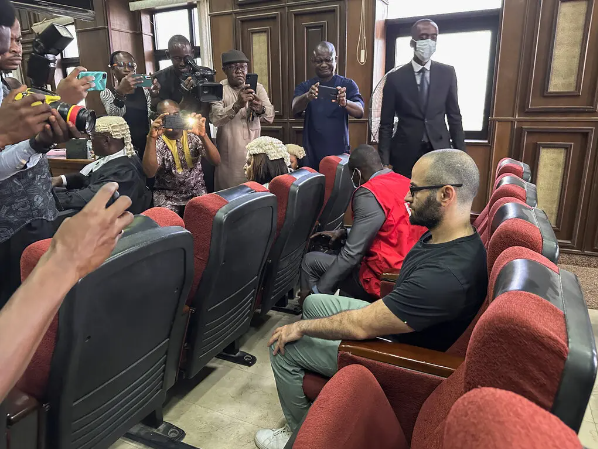A compliance officer of the cryptocurrency exchange informed senior executives and Nigerian contacts that the company had been requested to pay $150 million in cryptocurrency
A compliance officer for the colossal cryptocurrency exchange Binance, Tigran Gambaryan, received a disquieting message while travelling to Nigeria in January: The organization had forty-eight hours to transfer approximately $150 million in cryptocurrency.
The message was interpreted by Mr Gambaryan, a former U.S. law enforcement agent, as a bribe demand from a member of the Nigerian government, according to five individuals with knowledge of the situation and messages examined by The New York Times.
A cohort of his Binance peers and he had recently concluded a meeting with Nigerian lawmakers, who levied charges of tax evasion against the organization and issued detention threats against its personnel.

Binance representatives escaped Nigeria in a state of panic. According to two individuals aware of the document, Mr. Gambaryan submitted Binance’s attorneys a three-page report detailing the payment request later that month.
According to the sources, he also informed contacts within the Nigerian government and detailed the occurrence to them.
February marked the occasion of Mr. Gambaryan’s second journey to Nigeria, inspired by the episode. The Nigerian authorities detained him and a colleague, Nadeem Anjarwalla, upon his return, precipitating a crisis at Binance.
Four weeks ago, on April 8, Mr Gambaryan was transferred from a government compound to Kuje prison in Abuja, the capital of Nigeria. Since then, he has been detained there.
His case is the most recent legal headache for Binance, which settled charges from the U.S. government that it enabled criminal activity to prosper on its platform for a $4.3 billion fine last year.
Changpeng Zhao, the organization’s founder, received a four-month prison sentence in April for his involvement in the violations above.
The Nigerian authorities have indicted tax evasion and money laundering against both Binance and Mr Gambaryan. According to Binance, Mr. Gambaryan had no “decision-making authority” within the organization.
“The message from the Nigerian government is clear,” Richard Teng, chief executive officer of Binance, wrote in a blog post on Tuesday. “To maintain control over Binance, we must imprison an innocent mid-level employee formerly a federal agent of the United States in a perilous prison.”
A spokesman for Nigeria’s national security adviser, Zakari Mijinyawa, stated in a text that the Nigerian government would present its case “by due process and based on the facts and evidence.”
“We have every reason to believe Nigeria has a strong case, Binance will be afforded an equal opportunity to present its case and ensure that justice is served by the rule of law.”
Mr. Mijinyawa
In the blog post, Mr Teng detailed the historical trajectory of Binance’s involvement in Nigeria, a region that has emerged as a focal point for the cryptocurrency sector. It has the second-highest rate of cryptocurrency adoption globally, trailing only India, according to data firm Chainalysis.
Nigerian financial regulators ordered Binance to cease soliciting investors in Nigeria in a statement issued in 2023. Mr Teng stated that Binance ceased advertising nationwide and extended an invitation to meet with government officials.
But the escalation of tensions persisted. In recent months, Nigerian authorities have posited that Binance trading played a role in the depreciation of the national currency, the naira. A Nigerian House of Representatives committee also requested Binance representatives’ presence at a December hearing.
Mr Gambaryan and Binance employees met with those legislators on January 8. The legislators quickly escalated the situation into a contentious session by reading aloud a list of allegations against Binance, which included tax evasion. The blog post also stated that they threatened to pursue an arrest warrant for Mr Teng.
As Binance employees departed the meeting, “unknown persons” approached them, according to Mr. Teng, and suggested they pay to resolve the allegations. Mr. Teng wrote that a local attorney for Binance subsequently spoke with an individual claiming to be an agent of the House committee.
Mr. Teng wrote that the alleged agent demanded “a substantial payment in cryptocurrency to be paid in secret within forty-eight hours to resolve these issues.” The sum was approximately $150 million, according to four individuals who knew the situation.
“Our team departed immediately out of increasing concern for their safety in Nigeria,” Mr Teng stated in his post. “As expected, we declined the payment demand through legal representation, as we did not consider it a valid settlement offer.”
According to two individuals who knew the situation, Mr Gambaryan discussed the incident with colleagues and disseminated his report detailing the payment request after he departed Nigeria in January.
Mr Gambaryan coordinated meetings with Nigerian security and financial crimes enforcement officials later that month. According to a source with knowledge of the discussions, he observed that senior executives at the financial crimes office were anxious to discuss what had transpired at the meeting on January 8.
Last month, Dele Oyewale, a Nigerian Financial Crimes Commission spokesman, declined to comment on the payment solicitation via text message. Monday saw no response from him regarding a request for comment.
Mr Teng stated in his Tuesday post that Binance had been granted assurances regarding the safety of Mr Gambaryan upon his repatriation to Nigeria. Mr Teng wrote that a company adviser with extensive local connections advised Binance executives to meet with the Nigerian national security adviser’s office.
On February 26, Mr. Gambaryan and Mr. Anjarwalla arrived for that meeting. Mr Teng wrote that after a couple of hours of discussion, a Nigerian financial crimes official approached Mr Gambaryan and informed him that “everything was proceeding smoothly.”
Subsequently, a succession of Nigerian authorities entered the room and pressed Binance to furnish detailed information regarding its consumers in Nigeria; the company declined to comply with this demand.
The passports of Mr Gambaryan and Mr Anjarwalla were seized, and the two individuals were detained in a fortified compound for three weeks. Their attorneys were notified of impending criminal accusations on March 22.
Mr. Anjarwalla absconded the following day. After departing Nigeria, he has remained silent in public.
Mr Gambaryan entered the compound alone. According to a copy of the message that The Times was able to obtain, shortly after his arrival, financial crimes officials in Nigeria sent a memo to the U.S. Embassy in Abuja.
“It is crucial to underscore that Mr. Tigran is presently engaged in a dialogue with our team, and his presence is exclusively intended to facilitate constructive discourse,” the letter continued. “We can guarantee that the participant willingly engages in the activity.”
Soon after, Mr Gambaryan was relocated to Kuje, a notorious correctional facility where, in 2022, the Islamic State orchestrated a prison break.
The court has rescheduled a trial scheduled to commence last Thursday, May 17.



